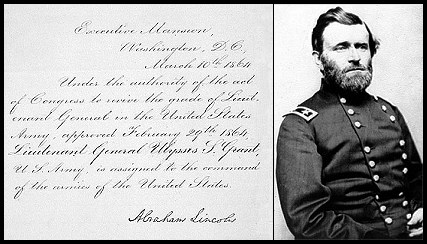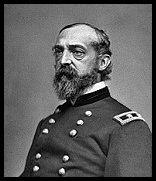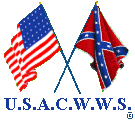| |
Lookout Mountain,
Missionary Ridge,
and Chattanooga...

View of Chattanooga (background) and the Tennessee River
(foreground) taken from Lookout Mountain - 2002.
| |

|

|
| |
Gen. U. S. Grant (left) with some of his officers
(right) on Lookout Summit - 1863.
(Note 128)
|
Photograph of the same location - 2002.
|
| |
[Comparing the 1863 photograph (left) to the 2002 photograph (right); In
the 2002 photograph, Grant stood near the location marked with an "A", his
officers were near "B" and the white dotted line marks the approximate
location of the edge of the cliff, which is visible in the 1863 photograph,
but hidden by foliage in the 2002 photograph.]
|
Promoted to Lieutenant General March 9, 1864 after his victory at Chattanooga,
Grant was then made General in Chief of the Armies of the United States just
three days later.
 44 44
General Ulysses S. Grant and his appointment as Lieutenant General,
Commander of all United States Armies, by President Abraham Lincoln.
Click
HERE to read the Appointment.
After his promotion, Grant decided to accompany General George G. Meade and
the Army of the Potomac in the East.
This caused Meade, the Army's commander, considerable frustration. in the East.
This caused Meade, the Army's commander, considerable frustration.
 50 50
General George G. Meade
As expected, Grant took over direct control of the Army of the Potomac.
Under his command, the Union Army fought Robert E. Lee and the Confederate
Army of Northern Virginia , during the
1864 Overland Campaign , during the
1864 Overland Campaign , in the
Wilderness, at
Spotsylvania, at
North Anna, at
Cold Harbor, and at
Petersburg. , in the
Wilderness, at
Spotsylvania, at
North Anna, at
Cold Harbor, and at
Petersburg.
In the Wilderness...
| |

Location of Grant's Headquarters
On May 5, 1864, this knoll was bordered by a second growth of scraggly
pines and scrub oak. From here Grant and Meade could see little of the
battle. Instead, they relied on subordinates to keep them apprised of
the situation at the front. In the evenings the Generals retired to
their camp at the foot of the knoll between here and the Germanna Plank
Road (modern Route 3). Otherwise, they rarely left this spot.
Over the next three days, as the two armies grappled in the deep woods,
Grant and Meade remained at this knoll, sending and receiving dispatches
as they fed troops into the battle.
More than once Meade lost his temper. Outwardly, Grant remained calm,
but his nervous puffing of cigars and whittling of sticks showed that
he too felt the strain.
Source: National Park Service
|
|
|
|
|



